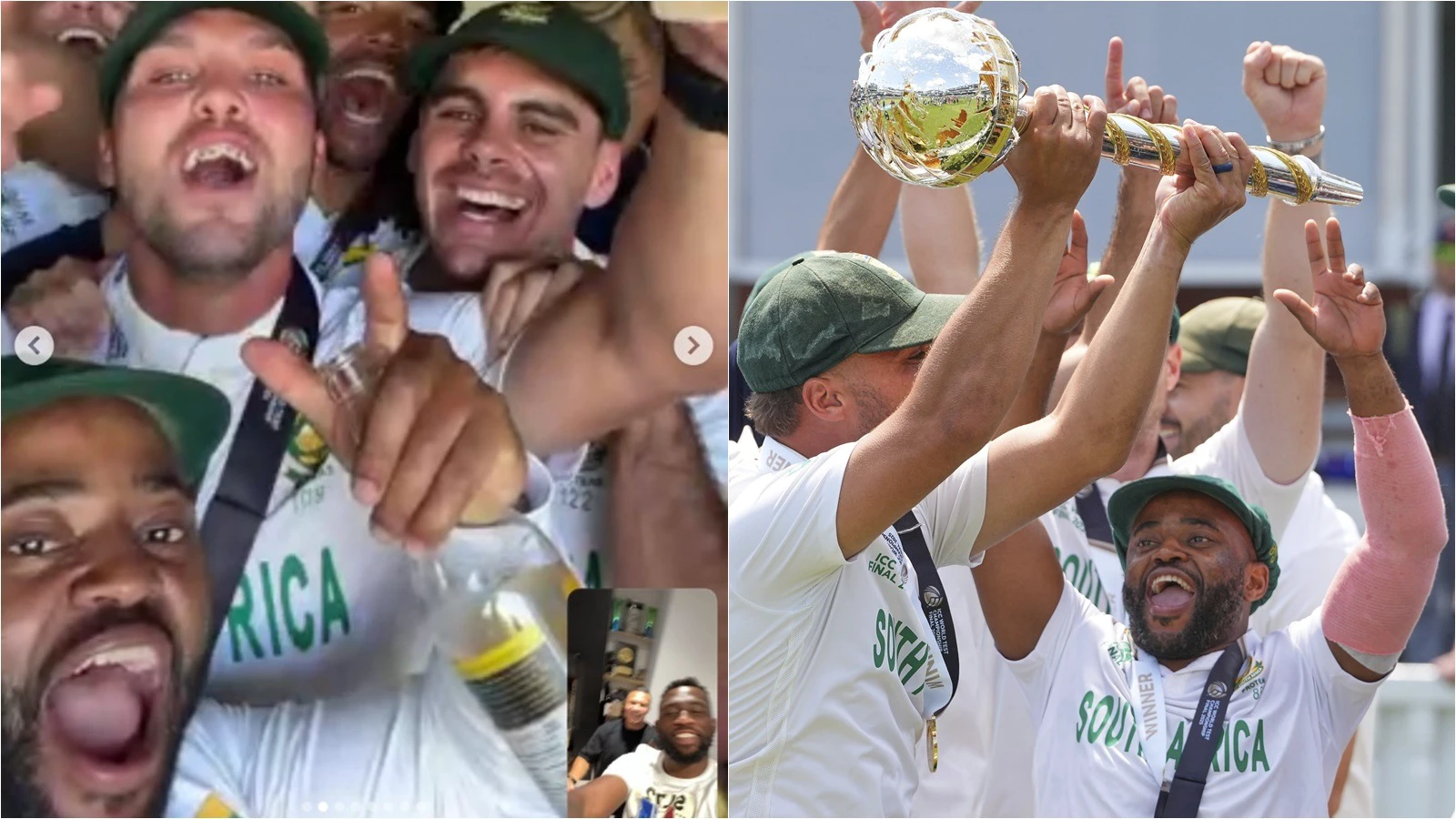When strains of that authentic rugby anthem, an ode to resilience, ‘Shosholoza’ – streamed out of a Lord’s corner, cricket was being ushered into an exalted space occupied by what is the gold standard of sporting excellence in South Africa.Both Temba Bavuma and the highly decorated rugby captain, Siya Kolisi have been showered with the sound of that melody. But aside of being the first Black world-title winning skippers, the Proteas and Springboks have little in common in how the destination was reached – 30 years apart really for their country’s first proper major crown.
Global glory, nothing less, needed to be etched in stone, or on a mace, for Bavuma to seek parity for his chosen sport, with what is the defining identity of South Africa – rugby.
After South Africa nervily knocked off the required runs on Saturday morning at Lord’s, Kolisi dropped a bunch of snaps in a slideshow on social media of how Bavuma and his merry men had spent the immediate moments in the dressing room, soon after lifting the mace: they FaceTimed with the Springboks and Kolisi happily bragged about the crossover.
The first Black captain in SA rugby must have known how hard it had been for his cricketing compatriot, Temba Bavuma. “FINALLY” he captioned, perhaps the only man on earth who understood Bavuma’s struggles as a skipper of a mixed-race unit, with its humongous political overtones, intimately.
But even Kolisi might admit that Bavuma had a far stiffer and deeper challenge in nailing down a global title than he ever did. The Springboks had won the rugby World Cup in 1995 once before, and never competed having to prove that they were not bottlers. They lost World Cups alright, but 15 men (or 22) in South Africa had treaded that path to glory before. Even when transformation kicked in, with steady inclusion of Black ruggers, there was a blueprint, an attested winning style of play, a clear memory of the most watertight scrum defenses and lineout routines, that teams could fall back on without perennially doubting if the plan worked.
The Bokks always carried that straight-backed swag in their skills and systems, that downed not just the Wallabies, but the All Blacks and the French, and the Irish. Kolisi and other Blacks like Cheslin Kolbe, Bongi Mbonambi and Makazole Mapimpi had deeply difficult stories of coming up, but walked into Rassie Erasmus’ structure, knowing they were bringing flair and formidability to an already strong scaffolding.
Bavuma on the other hand, inherited doubts and failures. And recurring echoes of those, that Kolisi, though an inspirational story in reaching the national team, would never have encountered when wading into battles of might, not the mind.
The pin-pricks of cloying mental doubts started even before the first ball was bowled. Each defeat in knockouts left a bloodied trail of shattered spirits across three formats and four continents.
Perhaps it was this shared misery, the intensely scalding memories of knock-outs, that turned the three wise men – Bavuma, Kagiso Rabada, and Aiden Markram – into a unit so tight that their resolves were turned to pure granite. That group of players knew the opponent was Australia, not the goal of transformation to include 81 percent of the Black population.
They wanted to be rid of the chokers tag, no doubt, but it stopped being a stranglehold that was capable of careening run chases, and like Bavuma said, they found deep reserves of the ability to fight back from almost any adversity, even a Josh Hazlewood torrent.
Proteas legends, Graeme Smith, AB de Villiers, Hashim Amla and Shaun Pollock were present at Lord’s in various capacities. But also making his way to Lord’s was Springboks legend Bryan Habana, himself a World Cup winning rugger, a superstar of the sport, but rallying around a cricket team that has picked for itself a luckless streak so stark and for so long, that every successful South African athlete wondered why misfortune struck them so routinely.
But the excitement of watching Bavuma’s men get past the line had rippled across generations of Bokks, who had courted success regularly. Springboks GOAT, Schalk Burger, declared that South Africa were now ‘double World champions.’ The Bokks, of course, have the last two quadrennial world titles. But cricket was now invited to the upper perch of sporting significance in a society steeped in winning at sport. Cricket had been the sore thumb until Saturday.
Proteas coach Shukri Conrad had taken his coaching group to a Springboks alignment camp just before the WTC, where pressure situations were minutely analysed and the Bokks’ countering mentality broken down into micro simulations, to help the Proteas riff off that knowledge. But even the great juggernaut would not have answers to the tea-time conundrum on Day 3 with Bavuma restricted by a snapped hammy.
“I was the one telling Bavuma he should not carry on batting. But Aiden and Temba insisted,” Conrad would recall later. Markram knew like a glorious menacing Springboks scrum rolling forward, that it was the mere sight of him and a limping Bavuma refusing to give in or give up and inching forward like sung in Shosholoza, that would break the Aussies. “Ultimately, these players know better than any of us,” Conrad would chucklingly admit.
The finest two of the Proteas batsmen tried. And try is a swell word in both rugby and cricket.
Even Rassie Erasmus was impressed. “Jaaaaa man, coach Shukz and Proteas, so proud Lekka,” he would say with glee. Lekka was the highest approval in Afrikaans. Cricket had happily found its hyphen with rugby.
